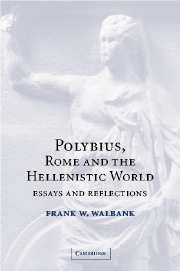Book contents
- Frontmatter
- Contents
- Preface
- Acknowledgements
- List of abbreviations
- 1 Polybian studies, c. 1975–2000
- HISTORICAL AND GEOGRAPHICAL PAPERS
- POLYBIUS AS A HISTORIAN
- 11 Timaeus' views on the past
- 12 Polybius and the past
- 13 The idea of decline in Polybius
- 14 Polybius' perception of the one and the many
- 15 Profit or amusement: some thoughts on the motives of Hellenistic historians
- POLYBIUS ON ROME
- TRANSMISSION OF POLYBIUS
- Bibliography
- Indexes
11 - Timaeus' views on the past
Published online by Cambridge University Press: 22 September 2009
- Frontmatter
- Contents
- Preface
- Acknowledgements
- List of abbreviations
- 1 Polybian studies, c. 1975–2000
- HISTORICAL AND GEOGRAPHICAL PAPERS
- POLYBIUS AS A HISTORIAN
- 11 Timaeus' views on the past
- 12 Polybius and the past
- 13 The idea of decline in Polybius
- 14 Polybius' perception of the one and the many
- 15 Profit or amusement: some thoughts on the motives of Hellenistic historians
- POLYBIUS ON ROME
- TRANSMISSION OF POLYBIUS
- Bibliography
- Indexes
Summary
The question I should like to try to answer in this paper is whether by the Hellenistic period there existed something that we could call a west Greek view of the past. There is no simple answer to this since, until one gets down as far as Diodorus, who was writing at the time of Julius Caesar, all the western Greek historians exist only in fragments; and indeed, after looking at the fragments, I fairly soon reached the conclusion that any discussion of their views about the past would have to centre on Timaeus. For that there is a good reason. Apart from Timaeus, the attested fragments of authors such as Antiochus and Philistus, not to mention lesser figures like Athanis of Syracuse, Timonides of Leucas, Callias and Antander, the brothers of Agathocles, and Alcimus, are so meagre – indeed in some cases we have little more than their names – that they emerge as wholly shadowy personalities. Nor is it simply that the fragments are few in number. In addition there is a strong likelihood that often these writers are being quoted at second hand via Timaeus. Consequently, if the fragments seem to suggest that their authors were interested predominantly in the same kind of things as Timaeus, that may well be because he quoted material from them which happened to fall in with his own interests.
For Timaeus himself the situation is a little better, though by no means wholly satisfactory.
- Type
- Chapter
- Information
- Polybius, Rome and the Hellenistic WorldEssays and Reflections, pp. 165 - 177Publisher: Cambridge University PressPrint publication year: 2002
- 1
- Cited by

